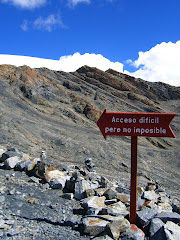I was talking to my mom on the phone about my recent shenanigan with my Country Director here in Peace Corps Peru and I was complaining that I felt like the authoritarian leadership style is ineffective and creates an environment that makes me want to run and hide under a rock, or maybe just away for a stealth beach vacation. She said she thought it was just the easiest option and does get results in the short term. She doesn't think it's a good way to keep good employees long term but, if you're working with a 2 year contract no one is going to worry about keeping you. I wonder if that's true. I mean if you hire a small group of people who you're in very close contact with it seems like it's easier to keep tabs on everyone's motivation and outcomes and go for long term growth in terms of human resources. But, if you have lots of volunteers most of whom haven't had jobs before scattered throughout the Peruvian highlands is authoritarian the only way to go? There are a lot of people, especially us overachiever Peace Corps types who really don't think that we're living without working as hard as we can. Even so, there certainly are times when I could try harder, do better or just try different options and I need some leadership to get me there. But is a methodology that mandates rather than lets you figure it out plausible inside this big and unwieldy bureaucracy? I have to think so.
I'm reading a book called The Fortune at the Bottom of the Pyramid. It's a great book and it's also sort of what I like to call a social science no brainer. It's a detailed but succinct description of how large companies are losing opportunities when they do not think of the global poor, the infamous masses who make less than $2 a day. It also criticizes lenders who haven't thought to market loan products to entrepreneurs with low incomes. So, for example here in Peru Pantene sells shampoo in little ketchup packets that cost 2 or 3 soles instead of big bottles that would cost 18 or 20 soles. One of it's basic assumptions that I completely agree with is that globalization is not something that you can really be against as it is a global economic reality. For me, it's sort of like being against grocery stores. You could try to buy direct from farmers and ranchers but it wouldn't really be feasible for large numbers of people because grocery stores are just the way of our economy. Anyway, why am I rambling and what does this have to do with leadership? I'm thinking about creativity and autonomy. The people "at the bottom of the pyramid" find the most innovative and appropriate technologies for their lives. If they are too constrained by having no capital or the power to use the resources that they do have they cannot contribute to the global economy and if multi-national companies don't take advantage of their insights they will lose money and probably not know it because they missed the concept that a market is there at all. I think it's that way for human resources too. If inside a company the human resources are so constrained by their rules and bosses that they're not allowed to create, doesn't the organization lose money? Or in the case of NGOs and government aid organizations, don't they miss out on development opportunities? How do you manage that with accountability in an environment where there are no profit margins to be the end all be all of measuring success?
Sunday, October 21, 2007
Authority, Autonomy and Creativity
at 5:31 PM
Subscribe to:
Post Comments (Atom)

3 comments:
Yes, you have a two year contract. Yes, it can be extended like an employees five year contract. After the in country extension, you can pick another country and do another two year contract. Yes, pick one.
The Director now has a new pension fund. It's for people living in country and, technically, a PCV might qualify.
The Inspector General(Congressional subcommittee and PC medical employees extending employment by increased clearances) just asked for the five year opportunity law for employees to be waived to the fullest extent of the law. The amswer is to make the five year law apply to all employees, including PCVs. So, the new law would be five years instead of two and an extension after that. If the law was changed to no five year opportunity law, the law would be the same for the PCV.
Check this yaho group. It's has alot of inromation: the files and links.
http://groups.yahoo.com/group/returnedpeacecorpsvolunteersoverseas/
I appreciate the info about the group. I’ll definitely check it out.
I think that you may have misunderstood my question. Sorry I did not write it well. I am in Peace Corps and I know that I have a two year contract. I was trying to ask about the efficacy of different leadership styles in different organizations. I wonder if it's true an authoritarian leadership style is actually effective with short term contract work with no space for pay increase (like the role of the Peace Corps Volunteer), as opposed to longer term work with the expectation that the worker will grow and climb the ladder. Thoughts?
Post a Comment